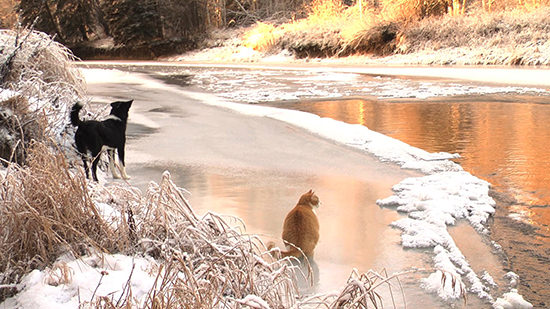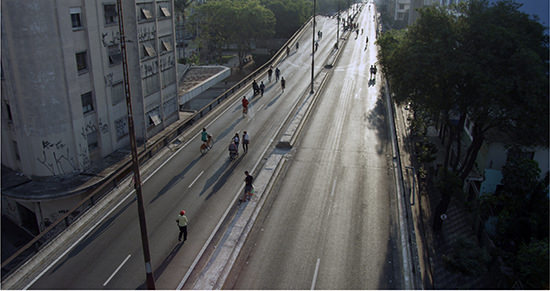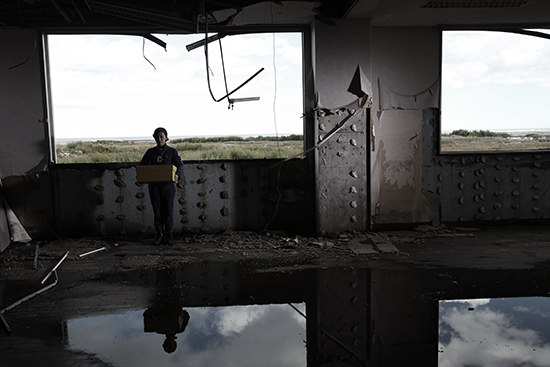Cinema that reshapes seeing, time and the human animal
Katerina Sakkas: REVELATION Perth International Film Festival

All the Time in the World
By turns measured and playful, entertaining and experimental, four films from this year’s Perth International Film Festival offer striking and unexpected perspectives on everyday habits, customs and sights, prompting questions about the nature of language, society, time and loss.
Aaaaaaaah!
With echoes of Will Self’s 1997 novel Great Apes, writer-director Steve Oram’s first feature presents a Swiftian scenario in which suburban humans behave like chimpanzees. Oram takes his place among an ensemble cast that includes off-beat comedy stars Julian Barratt and Noel Fielding as well as versatile character actor Julian Rhind-Tutt and Lucy Honigman, all of whom adapt their body language and vocal delivery with simian verve. Singer and actor Toyah Wilcox is notably expressive as the matriarch Barabara (sic).
As with Sightseers, the 2012 horror comedy directed by Ben Wheatley and co-written by Oram with Alice Lowe, Aaaaaaaah! (UK, 2015) explores domestic savagery in a distinctly English setting. The set-up provides a great excuse to poke fun at various social phenomena—TV celebrity chefs, stereotypical gender roles, ‘alpha’ males, shoplifting teens—while letting loose with scatological and sexual humour. But it also can be taken as something of a Dogma-style thought experiment posing questions about social rituals and niceties: eating with utensils, for example—or not having sex with your mother-in-law.
.jpg)
Aaaaaaaah!
Highlighting this anthropological approach, Oram occasionally uses nature documentary techniques: characters seemingly stalked by the camera; heightened naturalistic sound (eg heavy rain); zoomed-in close-ups of glaring eyes; and an ominous drone in the lead-up to a fight. In contrast, other passages are accompanied by driving rock instrumentals from King Crimson, situating the narrative more within contemporary cinematic drama.
In this world without elaborate language, where sound and physical cues are all-important, it’s surprising how clearly a wordless narrative emerges, how easily you’re drawn into the new normal. After the grunting, humping, shitting, murderous farce draws to a close, it takes a few moments to readjust to the more mannerly world of articulate speech.
All the Time in the World
With All the Time in the World (Canada, 2014), Canadian documentarian Suzanne Crocker chronicles her family’s experience living for nine months in a cabin in the Yukon wilderness, leaving digital devices, electricity, and—significantly—clocks behind. As with almost every task performed on camera—chopping wood, building a cache high above the ground to protect supplies from bears, digging an outhouse, berry-picking—the making of the documentary feels like a collaborative affair, one of the many imaginative projects that Crocker, husband Gerard and their three young children undertake during these isolated and rewarding months.
A few incidents occur that must have felt painfully tense at the time, but Crocker weaves them smoothly into an account that is largely one of unfolding delight. Her aim is not to create fly-on-the-wall suspense, but rather to relate retrospectively the transformative effects of her family’s woodland sojourn. This is both a warm portrait of a family adapting to nature’s rhythms and a contemplation of seasonal change in a part of the world where winter goes on for so long that “it has its own seasons.” The film is pieced together with exquisite long shots of the river freezing over, footage of children clambering through snow-laden woods, of woodland creatures and of the family’s ginger cat reacting photogenically to unfamiliar stimuli. Moving from the panoramic to close details of plants, animals and her children’s faces, Crocker evokes the rich diversity of the experience and the place.
Time, as the title suggests, is a recurring theme throughout. With this exploration of how our outlook changes when strict routines and time-keeping instruments are shed, Crocker issues a delicate call to reflect upon what is of value.

Invention
Invention
Invention (Canada, 2014), a compendium of several of artist Mark Lewis’ film installations, is an intense, inventive study of urban spaces and art objects, along with the incidental life that goes on within and around them. Like All the Time in the World, Invention concerns itself with the process of contemplation, but while Crocker’s documentary gently encourages its audience to slow down, Lewis offers no such choice, immediately immersing the viewer in a situation that proceeds at a luxuriantly unhurried pace, for example with languorous circling of a supine marble nude in a darkened museum. For most of its length, the film is silent. This is all about the eye: the act of observation; visual perception.
The camera moves almost imperceptibly. Action—of pedestrians, birds, vehicles—is slowed. Perspective tilts: down is up, up is down. There’s a sense of weightlessness, almost as though we’re underwater, especially in the gallery scenes. Lewis gravitates towards reflections, towards harmonies and repetitions within the landscape, whether random or architectural. The V-shape made by a window frame is echoed far below by a V-shaped path cleared of snow. This close observation and framing of scenes mimics the eye of a painter or photographer in search of a satisfactory composition.
The familiar is often rendered unfamiliar, the ordinary graceful, as in a scene of legs walking, viewed upside-down, making them appear oddly swanlike, or perhaps resemble marine life swaying in a nature documentary. In expansive aerial scenes, distant people become focal points, some reappearing, deliberately but unobtrusively, like ‘characters.’ Invention might require a concerted effort to breathe deeply, slow down and adjust to Lewis’ glacial pace, but the experience yields a fresh outlook that carries over into the real world. It’s hard to imagine a more absolute antidote to an over-stimulated age.

The Whispering Star
The Whispering Star
Slow pacing, extended landscape takes, use of repetition and the location of narrative interest within fine details also characterise Sion Sono’s reflective dystopian science-fiction feature. Like Invention, The Whispering Star (Japan, 2015) requires its viewer to slow down and focus. Shot almost entirely in black and white, exquisitely lit and composed, the film follows the methodical life of Yoko Suzuki, an android courier in a post-apocalyptic galaxy who travels from planet to planet delivering mysterious white boxes to the inhabitants of desolate locations. Everyone whispers, as though they have lost the power to speak.
The people Yoko encounters through her work are ghost-like, seeming to haunt the ruins of once populous places. Disconcertingly, the scenes where Yoko lands and walks with her box through various bleak vistas were shot in Fukushima. As Yoko makes her way along deserted roads lined by blighted trees; crosses a blasted seashore peopled with motionless black-clad figures; or cycles to an eerily derelict department store, The Whispering Star becomes a meditation on the loss of everyday life; a testament too to the stoicism of those affected by man-made disaster.
When Yoko is back on board her space-ship—a traditional Japanese dwelling on the outside with huge rocket booster, but banally humble within—the film’s progress is marked by the passage of days and the revolving set of mundane chores Yoko performs. In her life we witness routine, repetition, loneliness, perhaps—but also moments of inventiveness and curiosity side by side with quiet contentment; a meditation on what it means to be human and what it means to live.
Read our interview with REV’s Program Director Jack Sargeant for more about the festival’s 2016 program.
–
REVELATION Perth International Film Festival, 7-17 July
RealTime issue #133 June-July 2016






